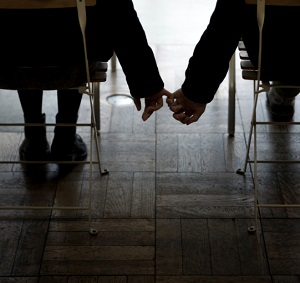 “In love we face challenges and in embracing these challenges, conflicts, and dark places, there is immense potential for transformation.” – J. Welwood
“In love we face challenges and in embracing these challenges, conflicts, and dark places, there is immense potential for transformation.” – J. Welwood
When conflict happens in your relationship, how do you react? Do you fly under the radar hoping to avoid detection, or come out fighting and go on the defensive?
Relationships can be wonderful, uplifting, and joyful, as well as challenging, painful, and destructive. When things are great and we’re getting along there is a feeling of deep connection and safety. But when there’s a sign of pain, misunderstanding, or disconnection, defenses are triggered and vulnerability goes into hiding. When conflict is viewed as a threat and met with defensiveness we get stuck in a power struggle that takes our relationship on an emotional rollercoaster ride.
Conflict isn’t a threat to your relationship. Sometimes we view conflict as a threat and respond to it as if it’s a sign that our relationship is in need of fixing or that one of us is at fault. In reality, conflict isn’t the problem—it’s how we meet conflict that becomes the problem.
Why We Don’t See Eye to Eye
When two people who grew up in two different homes decide to make a life together, conflict is going to happen. Each of us comes into relationship with different ways of seeing the world and when these perspectives clash, we encounter conflict. It isn’t about right or wrong; it’s about perception and how we see the world.
For example, if you grew up with a parent or sibling(s) who yelled and criticized you when they were angry, and this scared or frustrated you as a child, you might have learned to avoid angry confrontations at all costs. Now, in your present day relationship, if your partner gets angry your defensive reaction might be to ignore, shut down, or try to get your partner to calm down.
While your partner might benefit from learning how to tone down his/her anger, it’s also possible that your reaction to anger needs to change. The same goes for the partner who is angry—they may have grown up in a family where their needs weren’t being met so they learned that in order to be heard they had to yell, sulk, or complain.
If you both continue to meet this situation with defensiveness, then you’ll be mired in a power struggle that fills your relationship with negativity and resentment. If, on the other hand, you meet conflict with a willingness to listen and an intention to understand, and have empathy for each other, then there’s a potential for healing and growth to happen.
Shift from Conflict to Connection
Learning to become a healing partner takes patience, time, and commitment. Dr. Harville Hendrix, the founder of Imago Relationship Therapy, states that couples have the potential to become healing partners. He says, “It’s in relationship we are wounded so it’s in relationship we can heal.”
Learning to become a healing partner is what helps us develop a safe, intimate, and loving relationship. To get there it takes practice, patience, and a willingness to be vulnerable.
It’s when we learn to soften our defenses and become vulnerable and open that we begin to connect in a way that creates a feeling of safety, love, and connection. It only takes one partner to shift out of the power struggle and into connection. Below are some steps you can take toward helping yourself, your partner, and the relationship.
Steps to help soothe reactivity and calm difficult emotions:
- Develop awareness of your triggers. Notice when your body goes into flight, fight, flee mode. (I.e. rapid heartbeat, shallow breathing, muscles tensing, etc.)
- Take time out to soothe reactive emotions.
- During the time out, don’t dwell or analyze what happened. Let go of thoughts and stories and take care of yourself.
- Connect with your breathing. Breathe in and out slowly, and attune to the sensation of the breath flowing in and out of your body.
- As you breathe, scan through your body and soften the places that are tense.
- Feel a sense of self-compassion as you acknowledge feelings of hurt.
- Engage in activities that help alleviate stress, such as exercising, walking, meditating, or doing yoga.
- Once you are less reactive, see if you can connect with the need or hurt that’s beneath the trigger. Notice if you’re hooked into a story about what your partner’s intention was when you got triggered. Use the line, “What I told myself was_____. For example: “What I told myself when you were late to pick me up was that I’m not important to you.”
- Share what was going on for you (your feelings and needs) without blaming, criticizing, or attacking your partner. Use “I” statements and take responsibility for your reactivity. For example, “I feel hurt when we make plans and aren’t able to follow through.”
- Learn how to use intentional dialogue as a healing way to connect and learn about each other’s triggers, needs, and hurts. During this exercise, one person speaks as the other person listens with the intention of understanding, validating, and empathizing with the other, then switch.
- Feel compassion toward yourself and your partner when conflict happens.
- Be patient as you learn how to shift from a reactive response to one that heals and connects.
Meet Conflict with Acceptance, Understanding, and Empathy
Conflict in relationships is a catalyst for healing and growth. Learning to approach it in a healing way is challenging. It takes time, patience, and practice. In the end, if you want to develop an intimate, safe, and loving relationship, then it’s essential that you learn to approach it as an opportunity for healing and growth.
Remember, we come into relationship with past hurts, unmet needs, defenses, and parts of us that are in need of growth. When we let go of defenses and open our hearts to each other in a relationship, we create an opportunity for both of us to heal and grow—as individuals and as a couple—as we journey together through life.
May you have love, joy, and peace in your life.

The preceding article was solely written by the author named above. Any views and opinions expressed are not necessarily shared by GoodTherapy.org. Questions or concerns about the preceding article can be directed to the author or posted as a comment below.

 Staying Present and Open to Life
Staying Present and Open to Life How Therapy Can Help Prevent Future Unhappy Relationships
How Therapy Can Help Prevent Future Unhappy Relationships


Please fill out all required fields to submit your message.
Invalid Email Address.
Please confirm that you are human.
Leave a Comment
By commenting you acknowledge acceptance of GoodTherapy.org's Terms and Conditions of Use.